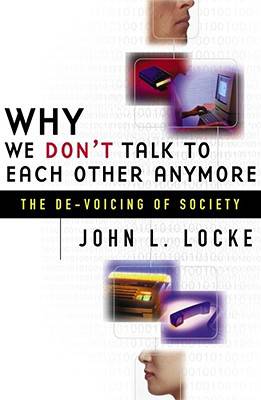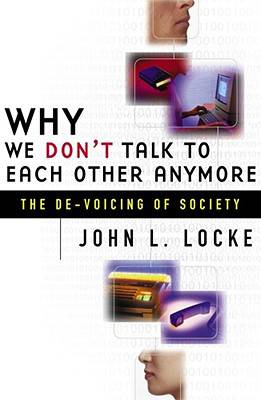
Je cadeautjes zeker op tijd in huis hebben voor de feestdagen? Kom langs in onze winkels en vind het perfecte geschenk!
- Afhalen na 1 uur in een winkel met voorraad
- Gratis thuislevering in België vanaf € 30
- Ruim aanbod met 7 miljoen producten
Je cadeautjes zeker op tijd in huis hebben voor de feestdagen? Kom langs in onze winkels en vind het perfecte geschenk!
- Afhalen na 1 uur in een winkel met voorraad
- Gratis thuislevering in België vanaf € 30
- Ruim aanbod met 7 miljoen producten
Zoeken
€ 28,45
+ 56 punten
Omschrijving
We Have Arrived at the Information Age -- But Not in Person
E-mail, voice mail, fax machines, beepers. Technology is overwhelming us with information, driving out the sound of human voices. We have gained the advantage of nearly constant interaction with others but make only partial connections; in the process, we are losing something precious. In this witty and intelligent book, prominent psycholinguist John Locke takes a hard look at what we are really missing as intimate forms of self-expression vanish.
Talking is the way we build and maintain relationships. Talking is the way that we learn to trust one another. But we now spend our days exchanging electronic factoids, leaving us little time to "just talk." Without intimate conversation, we can't really know others well enough to trust them or work with them harmoniously. We even lose track of our own selves -- our sense of humor, our own particular way of looking at things. We become lonely.
Keenly perceptive and though-provoking, Why We Don't Talk to Each Other Anymore is a provocative look at how we live with -- and without -- one another.
E-mail, voice mail, fax machines, beepers. Technology is overwhelming us with information, driving out the sound of human voices. We have gained the advantage of nearly constant interaction with others but make only partial connections; in the process, we are losing something precious. In this witty and intelligent book, prominent psycholinguist John Locke takes a hard look at what we are really missing as intimate forms of self-expression vanish.
Talking is the way we build and maintain relationships. Talking is the way that we learn to trust one another. But we now spend our days exchanging electronic factoids, leaving us little time to "just talk." Without intimate conversation, we can't really know others well enough to trust them or work with them harmoniously. We even lose track of our own selves -- our sense of humor, our own particular way of looking at things. We become lonely.
Keenly perceptive and though-provoking, Why We Don't Talk to Each Other Anymore is a provocative look at how we live with -- and without -- one another.
Specificaties
Betrokkenen
- Auteur(s):
- Uitgeverij:
Inhoud
- Aantal bladzijden:
- 256
- Taal:
- Engels
Eigenschappen
- Productcode (EAN):
- 9780684855745
- Verschijningsdatum:
- 31/08/1999
- Uitvoering:
- Paperback
- Formaat:
- Trade paperback (VS)
- Afmetingen:
- 137 mm x 216 mm
- Gewicht:
- 335 g

Alleen bij Standaard Boekhandel
+ 56 punten op je klantenkaart van Standaard Boekhandel
Beoordelingen
We publiceren alleen reviews die voldoen aan de voorwaarden voor reviews. Bekijk onze voorwaarden voor reviews.









